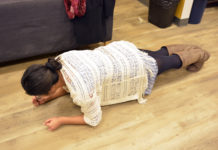On Monday, the University of Waterloo held a town hall with president Vivek Goel and vice-president of research and international Charmaine Dean on the topic of safeguarding research.
During his opening remarks, Goel noted the recent changes in the geopolitical landscape, citing in particular the changed dynamic between Canada and China. He stated that despite growing up in an era of positive change accompanied by positive global relations, information is not always used in the best interest of Western liberal democracy.
Dean added that the university was here for researchers in two main ways: by supporting them via the usage of risk assessments and risk mitigation strategies, and by advocating for barriers imposed due to stricter regulations escalated by the war in Ukraine. Dean cited several grounding principles such as transparency, predictability, engagement and inclusivity, and protecting researchers’ ability to obtain future grant supports.
During the Q&A period, topics brought up by faculty members and researchers included alternative funding sources, concerns regarding growing anti-Asian and anti-Chinese sentiment, and several complaints regarding a seeming lack of support for researchers by the university.
Several questions revolved around growing anti-Chinese sentiments fueled by recent tensions between Canada and China. Goel described the university’s attempts to inform the government that despite their policy of remaining country-race agnostic, anti-Chinese sentiments were growing either way. “We are constantly reminding them that regardless of what you say, this is what’s happening on the ground, and you have to be conscious of it,” he said. Dean added that “there is no room for that at this institution.”
Goel also stated that the university was taking steps to ensure support for those who feel targeted due to their race, studies, or the people they chose to partner with. When questioned later on what those supports were, Dean stated that although she could not yet say exactly what would be done, the university had “good conversations” with government officials and that it would be good for them to bring in experts who had already navigated similar situations, such as the change in the geopolitical landscape that occurred after the events of 9/11.
Another question fielded by Goel and Dean was one asking for advice for the many postdoctoral students from China whose work may suffer as a result of the tense relations between Canada and China. Dean stated that she was confident the university’s supervisors would make those students feel welcome, and that the university’s responsibility was to give them the best possible training. She emphasized that the university would not focus on past affiliations, stating, “It’s very clear from current discussions with the government that … it’s current affiliations that are of importance.”
Goel added that they had reminded the government to be as specific as possible on definitions of terms like “affiliation,” “institution” and “sensitive research areas,” and that UW would also like to see where collaborations with China could be continued, such as in areas of mutual benefit like climate change.
One computer science faculty member argued that Goel’s answer of collaborating in areas of mutual benefit was unhelpful, as one of UW’s strongest areas of research is in information technology, therefore placing a permanent target on UW.
When explaining whether the university was ordered to cut ties with Huawei, Dean listed two main reasons why UW chose to end the partnership, those being that all grant applications with Huawei over the course of 2021-2022 had been rejected, and that the province of Ontario expected its assessments to be applied internally as well. “At the end of the day, it’s all about safeguarding researchers.”
In response to a question inquiring about alternative sources of funding for work that was either partially or wholly funded by Huawei, Dean stated that several companies, who she would not name now, had reached out, and that there had been a “positive response” from ongoing discussions with the government on whether or not they would “step up to the plate.” Dean also stated that the university was working with leaders from the math, engineering, and science faculties to develop portfolios to present to the government.






























